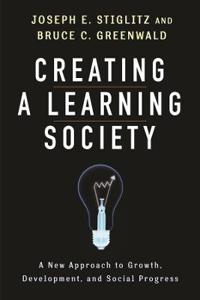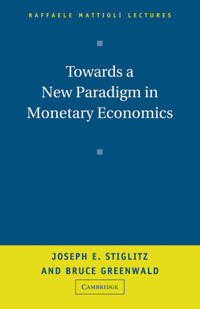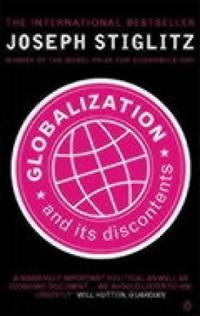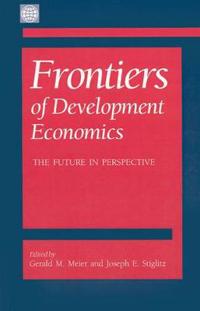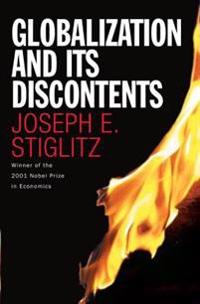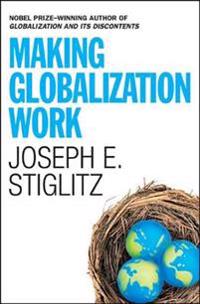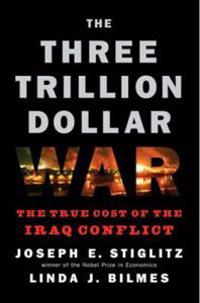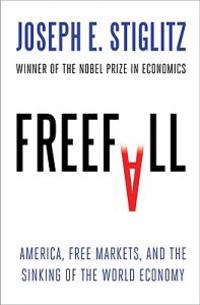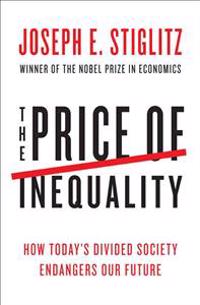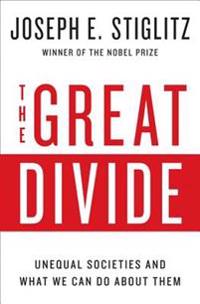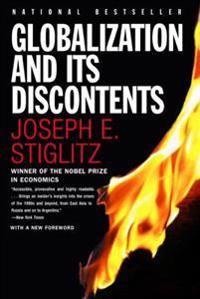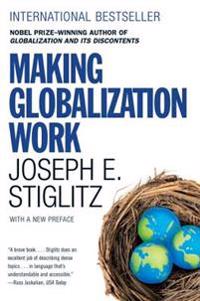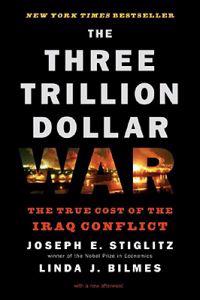Selected Works of Joseph E. Stiglitz (Inbunden)
avJoseph E. Stiglitz
ISBN: 9780199533701 - UTGIVEN: 200812This is the first volume in a new, definitive, six-volume edition of the works of Joseph Stiglitz, one of today's most distinguished and controversial economists. Stiglitz was awarded the Nobel Prize in Economics in 2001 for his work on asymmetric information and is widely acknowledged as one of the[...]
Selected Works of Joseph E. Stiglitz (Inbunden)
avJoseph E. Stiglitz
ISBN: 9780199533718 - UTGIVEN: 2013-05-05The second in a series of six volumes containing a selection of Joseph Stiglitz's most important and widely cited work. Volume I set out the basic concepts underlying the economics of information. Volume II extends these concepts and applies them to a number of different settings in labour, capital,[...]
Principles of Microeconomics (Pocket)
avJoseph E. Stiglitz, Carl E. Walsh, Joseph E. Stiglitz
ISBN: 9780393168181 - UTGIVEN: 2005-12Co-written by Joseph Stiglitz, winner of the Nobel Prize for his research on imperfect markets, and Carl E. Walsh, one of the leading monetary economists in the field, Principles of Microeconomics is the most modern and accurate text available.[...]
Creating a Learning Society (Inbunden)
avJoseph E. Stiglitz, Bruce C. Greenwald, Joseph E. Stiglitz
ISBN: 9780231152143 - UTGIVEN: 2014-05It has long been recognized that most standard of living increases are associated with advances in technology, not the accumulation of capital. Yet it has also become clear that what truly separates developed from less developed countries is not just a gap in resources or output but a gap in knowled[...]
Towards a New Paradigm in Monetary Economics (Pocket)
avJoseph E. Stiglitz, Bruce Greenwald, Joseph E. Stiglitz
ISBN: 9780521008051 - UTGIVEN: 2003-09Towards a New Paradigm for Monetary Economics presents a pioneer treatment of critical topics in monetary economics. Unlike the prevailing monetary theory, this book focuses not on the role of money in facilitating transactions, but on the role of credit in facilitating economic activities more broa[...]
Introductory Macroeconomics 1E + iStudy (Häftad)
avJoseph E. Stiglitz, Carl E. Walsh, Ross Guest, Max Tani
ISBN: 9780730315513 - UTGIVEN: 2014-11-30Introductory Microeconomics, 1st Australian Edition (Häftad)
avJoseph E. Stiglitz, Carl E. Walsh, Jeffrey Gow, Richmond
ISBN: 9780730315520 - UTGIVEN: 2014-11-30Principles of Economics (Pocket)
avJoseph E. Stiglitz, Carl E. Walsh, Jeffrey Gow, William Richmond, Max Tani, Wiley Australia
ISBN: 9780730319856 - UTGIVEN: 2015-07-03Globalization and Its Discontents (Storpocket)
avJoseph E. Stiglitz
ISBN: 9780141010380 - UTGIVEN: 200304In this hugely controversial book, the most recent winner of the Nobel Prize for Economics argues that though globalization should be a powerful force for good, it has been badly mishandled by the West (especially its lead institutions, the World Bank and the IMF) and that the anti-globalizing prote[...]
Frontiers of Development Economics: The Future in Perspective (Inbunden)
avJoseph E. Stiglitz, Gerald M. Meier, Nicholas Stern
ISBN: 9780195215922 - UTGIVEN: 2002-04With contributions from 35 leading economists, this forward-looking book explores the future of development economics against the background of the past half-century of development thought and practice. Outstanding representatives of the past two generations of development economists assess developm[...]
Fair Trade for All (Häftad)
avJoseph E. Stiglitz, Andrew Charlton
ISBN: 9780199219988 - UTGIVEN: 200707How can the poorer countries of the world be helped to help themselves through freer, fairer trade? In this challenging and controversial book Nobel prize-winning economist Joseph E. Stiglitz and his co-author Andrew Charlton address one of the key issues facing world leaders today. They put forward[...]
Fair Trade for All: How Trade Can Promote Development (Inbunden)
avJoseph E. Stiglitz, Andrew Charlton
ISBN: 9780199290901 - UTGIVEN: 2005-12-06Law and Economics With Chinese Characteristics (Inbunden)
avDavid Kennedy, Joseph E. Stiglitz, David Kennedy
ISBN: 9780199698547 - UTGIVEN: 2013-04Policymakers and economists largely agree that 'rule of law' and property rights are essential for a sound economic policy, particularly for most developing countries. But it is becoming increasingly apparent that transplanting legal frameworks from one society to another doesn't work - even though [...]
Law and Economics with Chinese Characteristics (Häftad)
avJoseph E. Stiglitz
ISBN: 9780199698554 - UTGIVEN: 201303Policymakers and economists largely agree that 'rule of law' and property rights are essential for a sound economic policy, particularly for most developing countries. But it is becoming increasingly apparent that transplanting legal frameworks from one society to another doesn't work - even though [...]
Whither Socialism? (Häftad)
avJoseph E. Stiglitz
ISBN: 9780262691826 - UTGIVEN: 199604The rapid collapse of socialism has raised new economic policy questions and revived old theoretical issues. In this book, Joseph Stiglitz explains how the neoclassical, or Walrasian model (the formal articulation of Adam Smith's invisible hand), which has dominated economic thought over the past ha[...]
Globalization and Its Discontents (Inbunden)
avJoseph E. Stiglitz
ISBN: 9780393051247 - UTGIVEN: 200206This powerful, unsettling book gives us a rare glimpse behind the closed doors of global financial institutions by the winner of the 2001 Nobel Prize in Economics. Renowned academic economist Joseph E. Stiglitz served seven years in Washington, as chairman of President Clinton's Council of Economic [...]
Making Globalization Work (Inbunden)
avJoseph E. Stiglitz
ISBN: 9780393061222 - UTGIVEN: 200608The Nobel Prize-winning economist and leading critic of globalization offers a fresh new approach to the issue that explains how to restructure an unstable global financial system, how nations can grow economically without damaging the environment, and how to devise a framework for free and fair glo[...]
The Three Trillion Dollar War (Inbunden)
avJoseph E. Stiglitz, Linda J. Bilmes
ISBN: 9780393067019 - UTGIVEN: 200802Reveals massive expenses associated with the Iraq War, including military equipment, veteran care, and Middle East restructuring projects, in a cautionary account that evaluates the war's long-term costs, both financial and human, as well as their consequences to taxpayers.[...]
Freefall (Inbunden)
avJoseph E. Stiglitz
ISBN: 9780393075960 - UTGIVEN: 201001The Great Recession, as it has come to be called, has impacted more people worldwide than any crisis since the Great Depression. Flawed government policy and unscrupulous personal and corporate behavior in the United States created the current financial meltdown, which was exported across the globe [...]
The Price of Inequality (Inbunden)
avJoseph E. Stiglitz
ISBN: 9780393088694 - UTGIVEN: 201206The top 1 percent of Americans control 40 percent of the nation's wealth. And, as Joseph E. Stiglitz explains, while those at the top enjoy the best health care, education, and benefits of wealth, they fail to realize that "their fate is bound up with how the other 99 percent live." Stiglitz draws o[...]
The Great Divide (Inbunden)
avJoseph E. Stiglitz
ISBN: 9780393248579 - UTGIVEN: 2015-04A singular voice of reason in an era defined by bitter politics and economic uncertainty, Joseph E. Stiglitz has time and again diagnosed America's greatest economic challenges, from the Great Recession and its feeble recovery to the yawning gap between the rich and the poor. The Great Divide gather[...]
Globalization and Its Discontents (Häftad)
avJoseph E. Stiglitz
ISBN: 9780393324396 - UTGIVEN: 200304An insider's analysis of the major institutions of globalization, this title details Joseph E. Stiglitz's disillusionment with the International Monetary Fund and other major institutions as they put the interests of Wall Street and the financial community ahead of the poorer nations.[...]
The Roaring Nineties (Pocket)
avJoseph E. Stiglitz
ISBN: 9780393326185 - UTGIVEN: 2004-10With his best-selling "Globalization and Its Discontents," Joseph E. Stiglitz showed how a misplaced faith in free-market ideology led to many of the recent problems suffered by the developing nations. Here he turns the same light on the United States. "The Roaring Nineties" offers not only an insid[...]
Making Globalization Work (Häftad)
avJoseph E. Stiglitz
ISBN: 9780393330281 - UTGIVEN: 200709Four years after he outlined the challenges our increasingly interdependent world was facing in Globalization and Its Discontents, Joseph E. Stiglitz offered his agenda for reform. Now in paperback, Making Globalization Work offers inventive solutions to a host of problems, including the indebtednes[...]
The Three Trillion Dollar War: The True Cost of the Iraq Conflict (Häftad)
avJoseph E. Stiglitz, Linda J. Bilmes
ISBN: 9780393334173 - UTGIVEN: 200809America has already spent close to a trillion dollars on the wars in Iraq and Afghanistan, but there are hundreds of billions of bills still due--including staggering costs to take care of the thousands of injured veterans, providing them with disability benefits and health care. In this sobering st[...]




